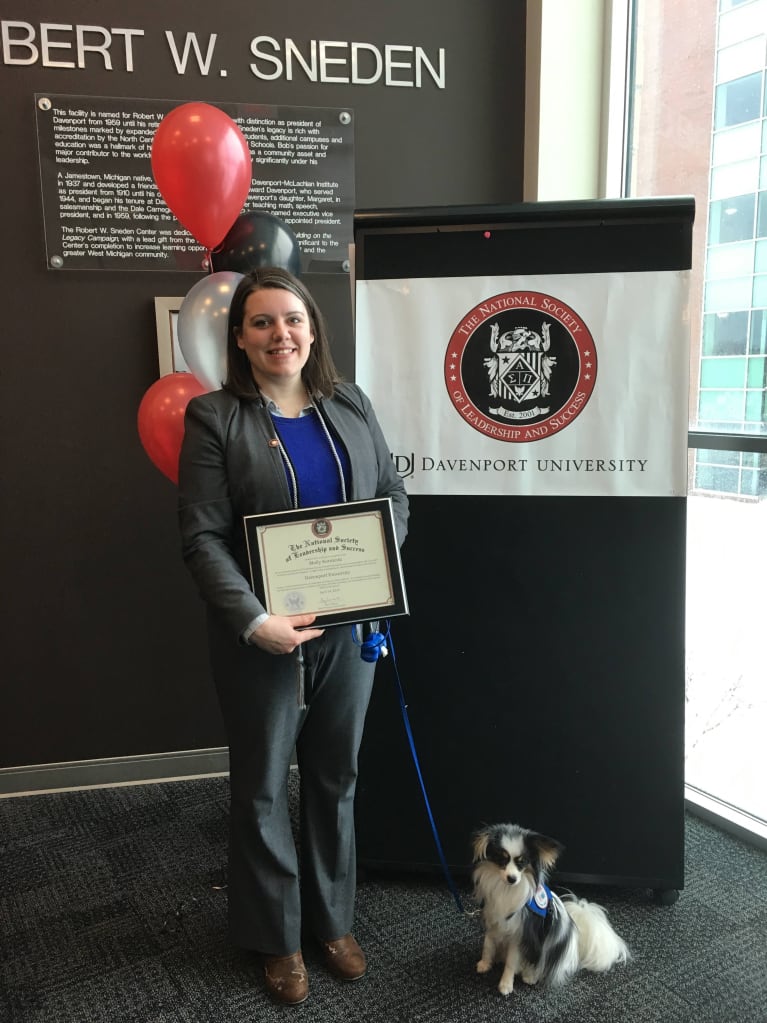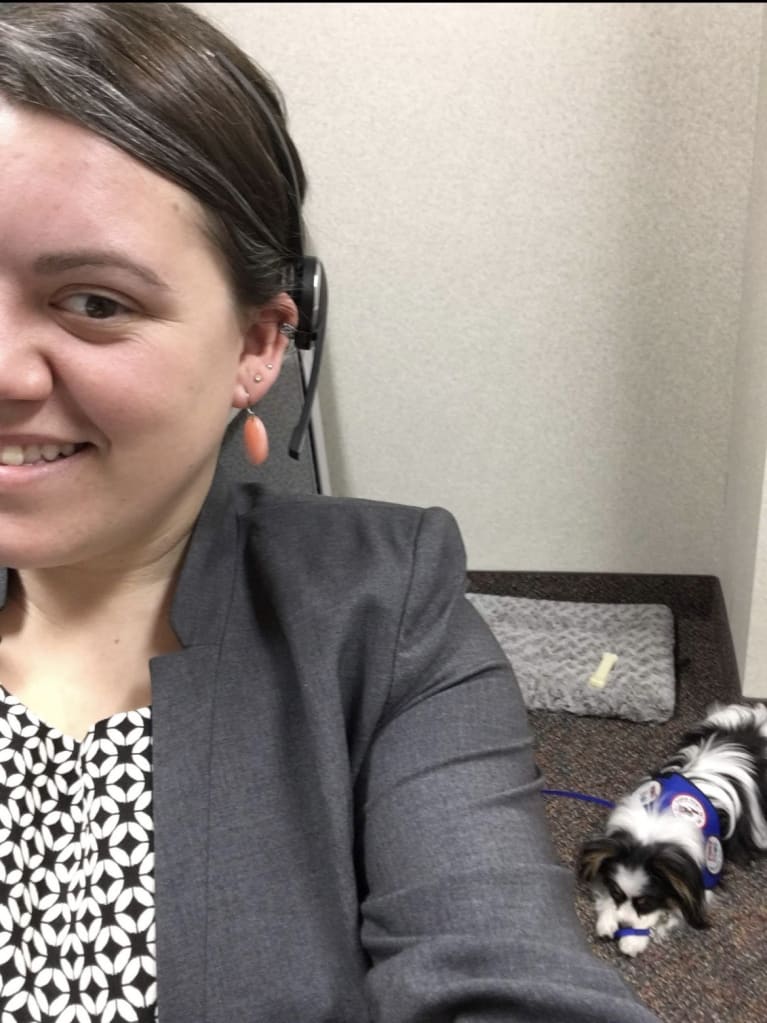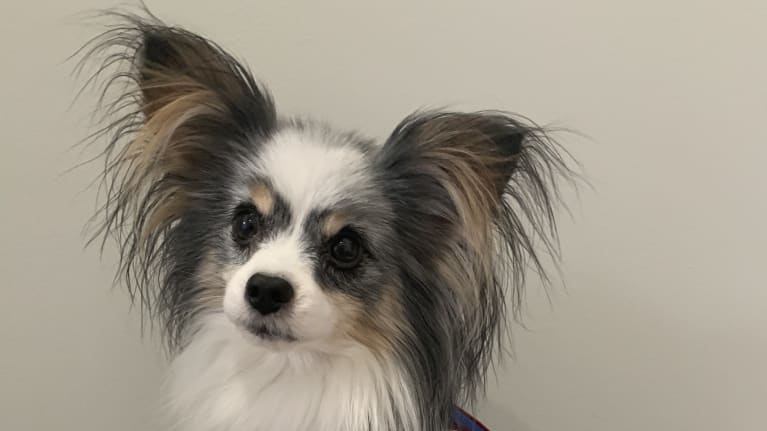Molly Koroleski was on the phone when the fire alarm in her office building went off. Koroleski, who is Deaf, has cochlear implants with Bluetooth technology that enable her to zero in on the voices on a phone call, completely eliminating all background noise. Koroleski was in a back office, unnoticed by her scrambling co-workers as they exited the building. Luckily, someone on her phone call interrupted the conversation to ask about the alarm that was sounding in the background. And luckily, it ended up being a false alarm.
“That was a wake-up call,” said Koroleski, auditor and assistant vice president at Huntington National Bank in Waterford, Mich.
Not being able to hear also meant she was missing out on interactions with her co-workers. One team of co-workers who worked in cubicles often offered informal invitations to lunch.
“As others piped up and said they were in for lunch, I couldn’t see them to read lips, so I didn’t answer. My co-workers thought I was ignoring them. I forget that because I am verbal, people don’t understand how Deaf I really am and how much I rely on lip reading,” she said.
Koroleski had heard about Paws with a Cause (PAWS), a trainer of assistance dogs, through some friends who helped train and foster the puppies. She submitted her application for a hearing dog. PAWS is accredited through Assistance Dogs International; meets standards for assistance dog etiquette, public access, obedience, health and well-being; and adheres to regular assessments for re-accreditation.
“Knowing the difference a PAWS dog makes in a client’s life reminds all of us—the staff, donors and volunteers—why we support this organization. These dogs do life-changing work, and everyone is proud to play a part in the process to get them to their final placement,” said Carrie Simmons, director of advancement at PAWS.
In April 2017, Koroleski completed a background check, interview and needs assessment with PAWS. One year later, she was matched with her tricolor papillon, Mater, born on Mother’s Day and named for the Latin word for mother. After basic obedience training, exposure to public settings and family lifestyle training, Mater was trained for Koroleski’s specific needs by PAWS training manager Crystal Snyder, who is certified through the U.S. Department of Labor.
One month before Mater’s training was completed, Koroleski started the conversation with her HR business partner (HRBP) about bringing Mater to work. Koroleski was well prepared to approach HR.
“I had already been open about my disability, so it wasn’t a surprise that I was requesting an accommodation. I’ve invested a lot of time to educate and advocate as I’ve usually been the first person with a disability to request accommodations in professional settings,” she said.
Andrea Stout is the accommodation specialist and employee relations consultant at Huntington National Bank. Her role is to advise and coordinate with members of the management team to educate them on their legal obligations according to the Americans with Disabilities Act and then implement a plan that will support their colleagues. Stout evaluates each request on a case-by-case basis and includes three key criteria in the decision-making process: work environment, the employee’s needs and how the business can help support the worker. Coordination with multiple stakeholders can take time, but Stout said that working with each worker to best understand their needs is the easy part.
Both Koroleski and her HRBP expressed concerns and discussed the challenges of having a dog in the office. The HRBP investigated the law, understood the role HR would play and ultimately agreed to support Koroleski and her dog.
Today, Mater and Koroleski are the essence of teamwork—and they work hard. “Unless I put him in his kennel, he is on duty. There’s no off switch,” Koroleski explained. “So, we both need work breaks.”
She always has his water bowl and plans ahead with food for late meetings or events. When working from home, which she has been doing since 2020, Mater alerts her to phone and computer calls, knocks at the door for deliveries, and timers when she’s cooking lunch.
“Mater gives me a sense of safety knowing he’d alert me in the event of fire or tornado,” she says.
Koroleski is thankful to have a small dog. “I just scoop him up and jump in a car without concern about messing up someone’s car or taking up all the space,” she said. When Koroleski is at the wheel, Mater alerts her to approaching emergency vehicles.
Mater has bolstered Koloreski’s sense of independence and comfort level when traveling for work. Mater is trained to alert her to hotel smoke detectors and fire alarms, tornado sirens, knocks on the door, or intruders.
“I needed Mater to give me peace of mind. I’m counting on him to protect me. It took time to build that trust. Before I had Mater, I lost so much sleep in hotels, alone and in silence, worrying about all the things that could go wrong. That didn’t make for a very good work day. Now, I sleep well knowing he’s got my back. I love waking up refreshed and on my game,” she said.
In the office, people are generally pretty excited to meet them both, though Koroleski does have to put limits on co-workers who want to pet or play with Mater—and has dealt with new colleagues who don’t understand Mater’s job.
“There have definitely been situations when pressed for a deadline that I would have preferred my time be respected rather than play show and tell with Mater. Occasionally, another employee will stop me in the hallway and ask 20 questions about Mater, if I’m lucky. When I’m not lucky, I’ve had people ask me to exit the building until they find someone with higher authority to decide if I can have my dog indoors,” she explained. “There’s no way for me to know in advance which people will be new friends and supporters and which ones will try to make me feel small.”
On the other hand, Koroleski said that the number of people who have gone beyond her expectations in supporting her and Mater in the office may be the most humbling part of her story. “I was just looking for more independence and a sense of safety. I never imagined gaining a whole community of support. We’re truly blessed,” she said.
Stout said, “Molly’s experience is wonderful and a prime example of how service and assistance animals can integrate into the workplace and help a colleague be successful while enhancing their safety and security at work.”
Koroleski envisions a workplace where colleagues with disabilities feel empowered to request accommodations without fear or judgment.
“People with disabilities always carry more on their shoulders. The last thing we need in our place of employment is unnecessary documentation and extra hoops to jump through for standard accommodations. For permanent disabilities—I’m not suddenly going to become hearing—I shouldn’t have to go through an audiogram that’s going to show I’m still Deaf to prove I need closed captioning or an American Sign Language interpreter,” she added.
“We have to keep educating and paving the way,” she added. Koroleski is excited to see workplaces of the future, especially those considering allowing animals in the office. “I know it can be a liability, but animals bring a great sense of comfort and joy.”
Making Music with Chester
At Brooklyn Arts Music Academy (BAMA) in Wilmington, N.C., Chester, a goldendoodle, has been coming to work since September 2018 with artistic director Linda Estep. Chester isn’t a service dog, but he’s become a part of the community at BAMA.
“He’s always watching out for everyone. If he hears someone come in the door, he barks and lets us know. Students enjoy being greeted by Chester. He loves to sit by students waiting for lessons and sit with parents while their children are in lessons,” Estep said. “I’ve had students tell me their favorite part of lesson day is seeing Chester.”
Estep says Chester is a pretty chill dog. He’s well behaved and was well socialized as a puppy. Because he started coming to work at BAMA when he was only three months old, it’s normal for him to sit or cordially greet people all day long.
“Because of his health issues as a tiny puppy, Chester had to eat small meals every two hours. It made sense to bring him to work. As he grew, we’ve all adapted and made it work,” Estep said. “Chester is a wonderful addition to BAMA and brings joy and happiness to many.”
It seems Koroleski’s vision of offices populated with pets might not be so far-fetched after all.
Beth Klahre is a freelance writer based in Wilmington, N.C.

